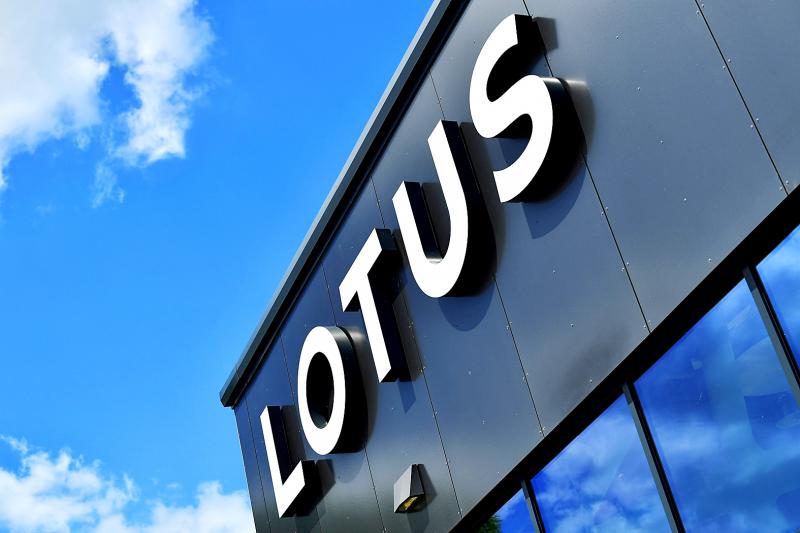Lotus Tech, which develops vehicles for the Lotus brand, is working on preliminary plans for an initial public offering (IPO) in Hong Kong or the US to help fund the sports and racing cars firm to an all-electric automaker.
The company is studying a potential IPO as soon as 2023 if sales go well, Group Lotus chief executive officer Feng Qingfeng (馮擎峰) said in an interview yesterday.
There is also the possibility that Lotus Cars would list in the UK, but no timetable has been set, Feng said.

Photo: Reuters
Lotus Tech, which broke ground on its global headquarters in Wuhan, China, last week, is tapping the potential for sports vehicles in the world’s biggest auto market against a small pool of competitors including Porsche Automobil Holding SE and BMW AG.
Lotus is part of the auto empire of Li Shufu (李書福), who founded Zhejiang Geely Holding Group Co (吉利控股集團) and has long held ambitions of developing top-end sports cars.
The unit plays an important role in the group, which offers products ranging from affordable mass-market vehicles to the ultra-luxury racing cars made by Lotus.
The appetite in China for high-performance sports cars has proven to be surprisingly strong, with pre-orders for Lotus Emiras topping 3,000 since opening on Aug. 20.
While a price has not been set, British media have reported that the vehicle would start at about £60,000 (US$83,000).
The demand more than doubled company estimates, Feng said.
Half of Lotus’ total sales might be from China in five years, when annual global deliveries are forecast to reach about 120,000 to 150,000 units a year, he said.
Lotus vehicles made in China would be exported to markets including Germany, the Netherlands and the UK starting in 2023, Feng said.
Lotus Tech, which last week announced an investment pact with a unit of Chinese electric vehicle (EV) maker Nio Inc (蔚來), plans to start another fundraising round at the beginning of next year, he said.

Taiwan Semiconductor Manufacturing Co (TSMC, 台積電) secured a record 70.2 percent share of the global foundry business in the second quarter, up from 67.6 percent the previous quarter, and continued widening its lead over second-placed Samsung Electronics Co, TrendForce Corp (集邦科技) said on Monday. TSMC posted US$30.24 billion in sales in the April-to-June period, up 18.5 percent from the previous quarter, driven by major smartphone customers entering their ramp-up cycle and robust demand for artificial intelligence chips, laptops and PCs, which boosted wafer shipments and average selling prices, TrendForce said in a report. Samsung’s sales also grew in the second quarter, up

On Tuesday, US President Donald Trump weighed in on a pressing national issue: The rebranding of a restaurant chain. Last week, Cracker Barrel, a Tennessee company whose nationwide locations lean heavily on a cozy, old-timey aesthetic — “rocking chairs on the porch, a warm fire in the hearth, peg games on the table” — announced it was updating its logo. Uncle Herschel, the man who once appeared next to the letters with a barrel, was gone. It sparked ire on the right, with Donald Trump Jr leading a charge against the rebranding: “WTF is wrong with Cracker Barrel?!” Later, Trump Sr weighed

HEADWINDS: Upfront investment is unavoidable in the merger, but cost savings would materialize over time, TS Financial Holding Co president Welch Lin said TS Financial Holding Co (台新新光金控) said it would take about two years before the benefits of its merger with Shin Kong Financial Holding Co (新光金控) become evident, as the group prioritizes the consolidation of its major subsidiaries. “The group’s priority is to complete the consolidation of different subsidiaries,” Welch Lin (林維俊), president of the nation’s fourth-largest financial conglomerate by assets, told reporters during its first earnings briefing since the merger took effect on July 24. The asset management units are scheduled to merge in November, followed by life insurance in January next year and securities operations in April, Lin said. Banking integration,

LOOPHOLES: The move is to end a break that was aiding foreign producers without any similar benefit for US manufacturers, the US Department of Commerce said US President Donald Trump’s administration would make it harder for Samsung Electronics Co and SK Hynix Inc to ship critical equipment to their chipmaking operations in China, dealing a potential blow to the companies’ production in the world’s largest semiconductor market. The US Department of Commerce in a notice published on Friday said that it was revoking waivers for Samsung and SK Hynix to use US technologies in their Chinese operations. The companies had been operating in China under regulations that allow them to import chipmaking equipment without applying for a new license each time. The move would revise what is known